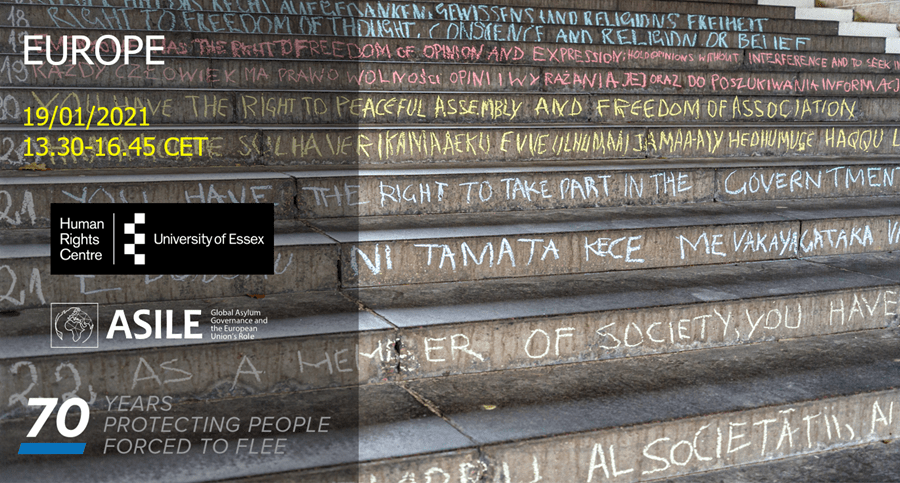70 Years Protecting People Forced to Flee - Europe
University of Essex and ASILE Network
-
Tue 19 Jan 21
12:30 - 16:00
-
Online
Zoom
-
Event type
Conferences
-
Event organiser
Human Rights Centre
-
Contact details
Claire Simmons GAIN@essex.ac.uk
Please join us for the Europe session of the Global Conference: 70 Years of Protecting People Forced to Flee.
This conference is being held to commemorate the 70th anniversary of the Statute of the Office of the United Nations High Commissioner for Refugees (UNHCR). The conference is a partnership between UNHCR and the Global Academic Interdisciplinary Network (GAIN), established under the 2018 Global Compact on Refugees.
The Europe session is organised by the University of Essex and the ASILE Network.

About the event
The concept of protection of individuals under the general framework of international law is complex and there is no single definition. Within the umbrella of international law, how do international refugee law, international human rights law and international law of armed conflict frame protection in complex emergencies? Given the protracted nature of displacement, how does one incorporate humanitarian and development approaches, how does one measure the protection contributions of different states, some who host refugee, IDP and stateless populations, while others constitute the donor community? All in different ways engage in protection until the ultimate protection, a durable and sustainable solution, can be achieved.
Over the past 70 years, Europe has provided protection and solutions directly and indirectly. The end of World War 2 led to massive displacement even after 1945. However, for over 30 years, Europe primarily provided protection through resettling a small number of refugees from outside the region and through aid and trade agreements. The conflicts in the 1990s in the former Yugoslavia and the FSU saw a return to direct protection, but also a reduction in the strength of that protection within the EU (Temporary Protection).
The GCR adds a new dimension to protection and solutions and also to the operationalization of interoperability between different actors. How does Europe fit into the new model of the international community acting as a whole?
You can find out more about the global conference, including links to other regional events, on the GCR website.
Tuesday 19th January 2021
Panel 1: University of Essex
Developing Protection from the Outset: A Word of Many (Too Many?) Meanings
12.30-14.00 GMT (13.30-15.00 CET)
Chair: Professor Geoff Gilbert, Professor of International Human Rights & Humanitarian Law, University of Essex (UK)
Speakers:
- Rossella Pagliuchi-Lor (UNHCR Representative to the UK)
- Ahmed Shaheed (Special Rapporteur on Freedom of Religion or Belief, United Nations)
- Claire Simmons (PhD Candidate, GAIN Secretariat, University of Essex (UK)
- Abdikadir Bare Abikar (Co-founder of the Dadaab Response Association; 2020 fellow at the British Institute in Eastern Africa, and Master of Education graduate through the Borderless Higher Education for Refugees Project)
Panellists will reflect on how the concept of protection has developed under international law since the creation of the UNHCR Statute in 1950. Discussants will consider what protection means for individuals under international refugee law, international human rights law, international humanitarian law, and public international law generally. Panellists will look at how European responses have been influenced by external voices and how practice and developments in Europe affect protection beyond the region.
- Professor Jens Vedsted-Hansen (Aarhus University, ASILE Partner)
- Professor Rosemary Byrne (NYU Abu Dhabi)
- Professor Audrey Macklin (University of Toronto, ASILE Country Expert and Advisory Board Member)
- Dr Meltem İneli Ciğer (Suleyman Demirel University, ASILE Partner).
- Mohammed Badran (Syrian Volunteers Netherlands (SYVNL)
- Anila Noor (Policy advisor on Diversity, integration & Gender Inclusion)
- Dr Nikolas Tan (The Danish Institute for Human Rights, ASILE Partner)
Panel 2: ASILE Network
Unpacking EU Asylum Policy in light of the UN Global Compact on Refugees: The Impacts of Containment on Trust and Refugee Protection.
14.15-15.45 GMT (15.15-16.45 CET)
Chair: Roberto Cortinovis (CEPS, ASILE Partner)
Speakers:
Discussants:
The UN Global Compact on Refugees (GCR) constitutes a unique world-wide framework of cooperation on refugee protection to assess and examine EU asylum policies.
The adoption of the New Pact on Migration and Asylum by the European Commission reveals the continuation of previously existing asylum policies focused on containment, and the increasing use of non-legally binding and financial instruments or arrangements fostering protection elsewhere or refugee deterrence policies. Simultaneously, the Pact promises increased refugee mobility through legal pathways to admission.
This Session will assess the most recent developments in EU Asylum Policy from the perspective of their impacts on the UN GCR core guiding principles: international refugee protection and human rights. It will examine the ways in which EU policies focused on 'contained mobility' affect trust in internal and external EU asylum policies.
Particular attention will be paid to the ways in which refugee voices and agency could be better tailored in EU asylum decision-making dynamics.
This Session falls within the scope of the Horizon 2020 Project ASILE (Global Asylum Governance and European Union's Role). For more information see https://www.asileproject.eu/
How to join this event
To join this online workshop please register on Eventbrite. Upon registration, you will be sent the webinar ID’s. The webinar will be accessible via Zoom. Please make sure you have created a Zoom account in advance of joining the workshop, if you haven’t yet, please create an account in advance. If you are a University of Essex staff member or student please follow the instructions on how to create an account.
The event will also be live-streamed on the Human Rights Centres YouTube channel. For those who cannot join this online workshop, the videos of each panel will be posted afterwards on our social media channels.
How to ask questions
When attending the events, please use the Q&A box to ask your questions, the chair of each session will take a selection of questions at the end of each panel.
Further Information
If you have any queries, please contact Claire Simmons via email on GAIN@essex.ac.uk.